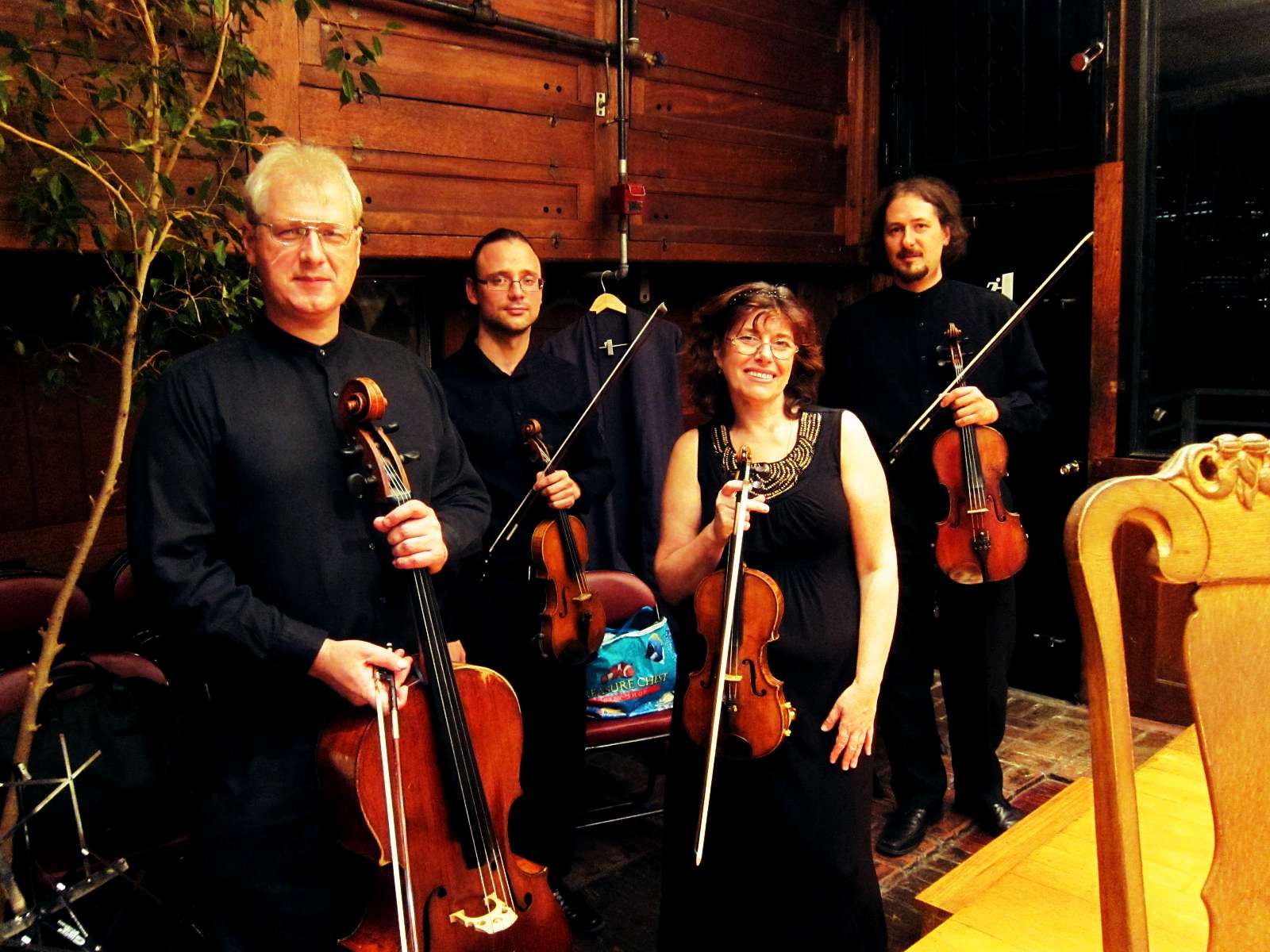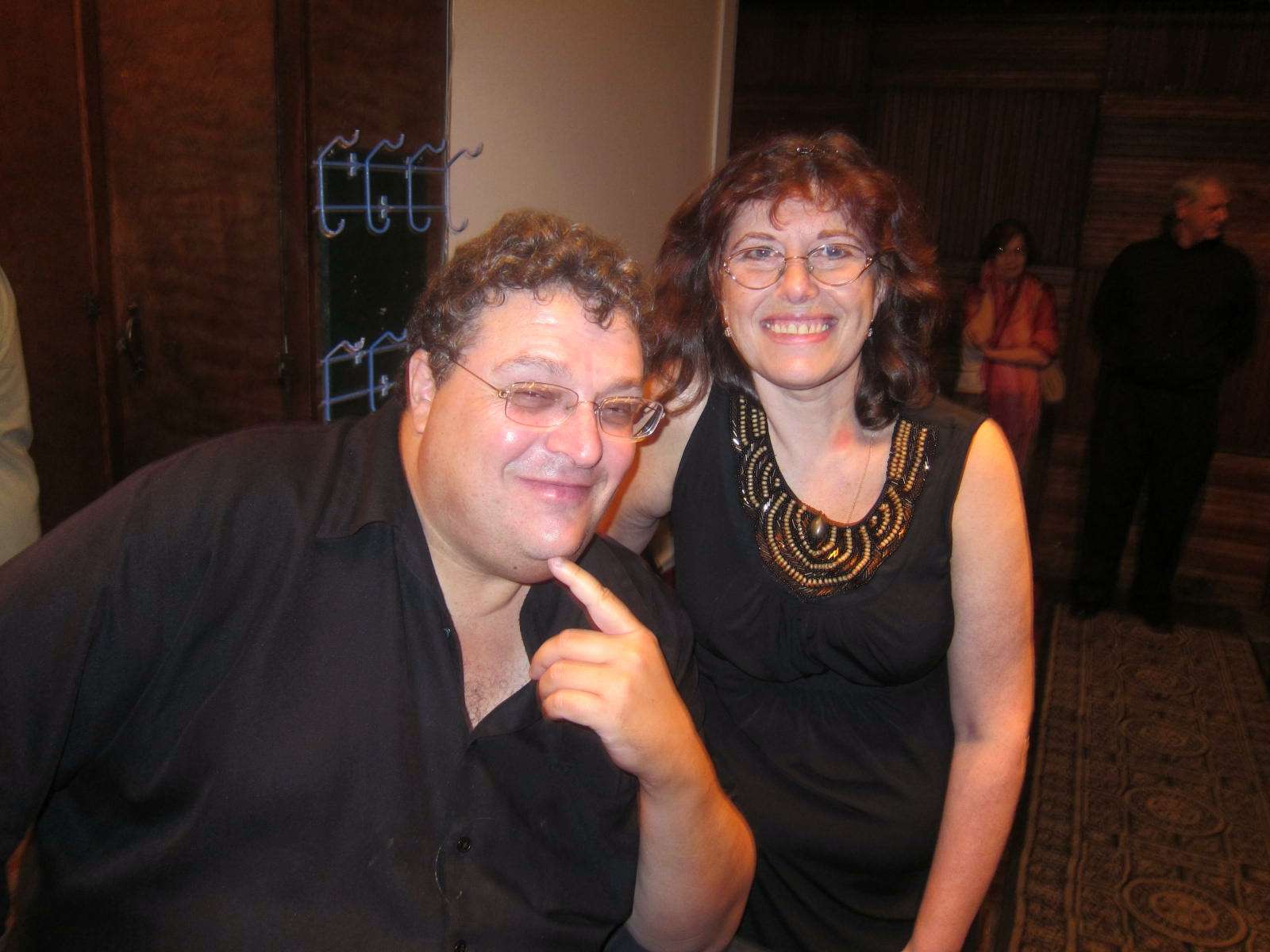|
Back
From Russia With Discipline New York
Bargemusic
08/10/2013 - & August 11, 2013
Wolfgang Amadeus Mozart: String Quartet No. 15 in D Minor, K. 417b [421]
Benjamin Britten: String Quartet No. 2 in C Major, Opus 36
Peter Ilyich Tchaikovsky: String Quartet No. 2 in F Major, Opus 22
St. Petersburg String Quartet: Alla Aranovskaya, Evgeny Zvonnikov (Violins), Boris Vayner (Viola), Leonid Shukayev (Cello)

The St. Petersburg Quartet (© Coco. T. Dog)
What’s in a name? Last night’s string quartet started life as the Leningrad String Quartet way back in 1985, and obviously had to change their name to St. Petersburg String Quartet as the Soviet Union changed its own name to Russia. Today, the group is primarily in America, but it would obviously be foolish to rename themselves the Wichita String Quartet (where they did reside). And for good reason.
From Tsar Peter to Dostoyevsky to Shostakovich and Valery Gergiev, St. Petersburg/Leningrad has established a brand (oh, hateful word!) as a display of the greatest arts of their country. But forgetting about that brand, this ensemble has endeared itself both to its native land and its adopted country.
That was the main reason (outside of the beauty of Bargemusic itself at dusk on a balmy summer dusk) to hear this group in the flesh. The second, I reasoned, if one must listen to a long Tchaikovsky string quartet, it’s even better with the shadows of Russia’s great metropolis in the foreground. And third, this was not the oft-played First string quartet of the composer, but his rare Second.
It was the final work of the program, and the St. Petersburg Quartet did not disappoint. It was evidently Tchaikovsky, but it was not the sometimes bathetic lachrymose composer. In fact, whenever he seemed on the edge of woefulness, the composer brought in a little folk tune to lighten the proceedings.
The St. Petersburg Quartet got right down to it, trying to play as one person, yet not quite succeeding. For this quartet needed, above all, a First Violinist who could make this into virtually a concerto. In Alla Aranovskaya, they had that soloist.

M. Peskanov, A. Aranovskaya (© Coco T. Dog)
Bargemusic Artistic Director Mark Peskanov, himself a product of Russian violin music and a soloist in his own right, well understood well how his friend handled this. The concertante violin in the first movement and the virtual solo performance in the finale gave a sheen to the Tchaikovsky that was as rare as the work itself.
There were moments of surprising pleasure here, like the lopsided Trio of the Scherzo and the fugue at the end. But the St. Petersburg ensemble, perhaps in deference to their soloist, never took chances, never made it unreasonably emotional. In fact, it had the aura of pure music, feelings put aside for the duration.
(Perhaps to make up for it, they encored with a 30-second Jewish dance, so jolly that one felt like getting up for a square dance. They ended all too soon.)
I do wish they had taken those chances with the extremely difficult opening Mozart 15th String Quartet. Not technically difficult, perhaps, for these fine players, but emotionally. This was not the charming Mozart we expect, but a dark Mozart seesawing between major and minor (in fact, minor was the key for three of the four movements). Yet the group began playing almost by rote, lacking anything approaching the drama of the piece, but slowly working into its fierce emotions. Like the Tchaikovsky, this was pure ensemble-making, a series of jewel-like sections which rarely gave entrance to the emotions which created it.
Whatever the relative disappointment of these two works, the Britten Second Quartet–a work which was premiered during a concert given in Auschwitz after the war in 1945– had moments that could only be called unforgettable.
Part of this was Britten’s inspiration itself. Nothing was more beautiful than the ending of the opening movement, with its harp-like sonorities against the softest melodies. Part was due to the St. Petersburg group. The cadenzas for each instrument, the ethereal playing in thirds long passages for violinists Aranovskaya and Evgeny Zvonnikov.
But it was this third movement, this tribune to Henry Purcell and all the “ancient” forms so seamlessly woven together which brought this quartet to such a magnificent finale.
Two weeks ago at the Maverick Festival, I had heard Britten’s final quartet, which, in its elegaic sounds, “raged, raged against the dying of the light.” Nothing raged in this work, and the St. Petersburg String Quartet showed an ensemble appreciation of an uncommonly ethereal work for the composer’s centenary.
A final note. Benjamin Britten insisted on calling the last movement a “Chacon” in deference to Purcell’s 17th Century spelling. Perhaps that was a bit dainty, but it did bring forth a couplet, possibly written by Verlaine:
“Chacony? Chaconne? The spell’s up to you./
“As we say in Paree, Chacun à son goût.”
Harry Rolnick
|